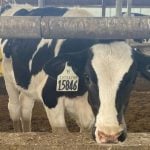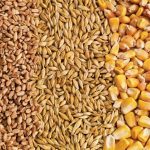The cost and availability of food and other pocketbook topics are the top issues keeping Canadians up at night, according to new data from the Canadian Centre for Food Integrity.
Cost is also the top issue driving distrust in the food system.
The centre provided highlights of its 2022 public trust survey in a Nov. 24 webinar and at the Canadian Organic Trade Association’s Organic Summit on Nov. 21. Research coordinator Ashley Bruner presented at both events.
Read Also

Farm Credit Canada forecasts higher farm costs for 2026
Canadian farmers should brace for higher costs in 2026, Farm Credit Canada warns, although there’s some bright financial news for cattle
The public trust survey, conducted online this summer, spoke with nearly 3,000 Canadian adults across the country. The centre identified five top issues in 2022 and cost of food rated the highest.
[RELATED] Comment: Inflation narrative a ‘virus’ and policy headache
Sixty-nine per cent of respondents said they were concerned about the cost of food, up from 61 per cent last year and 56 per cent in 2020. Sixty-six per cent said they were worried about inflation. This is the first year CCFI tracked this issue.
Fifty-eight per cent said they were worried about energy costs, up from 52 per cent in 2021 and 46 per cent in 2020. Keeping healthy food affordable concerned 56 per cent, up one per cent from last year.
The Canadian economy, in general, worried 53 per cent, up from 49 per cent in 2021.
Those most concerned about these issues were women, seniors, those who said they did at least some of household grocery shopping, and Canadians with a household income of less than $40,000.
Cost of living and economic issues unseated climate change as a top concern, though concern about climate change and environment was comparable to previous years, said Bruner.
[RELATED] Consumers will eat less meat in 2023: report
Availability of quality food worried 44 per cent of respondents, and 39 per cent said they were worried about having enough food to feed Canadians.
Public opinion about the food system, which experienced a positive bump over the pandemic years of 2020 and 2021, saw a return to near pre-pandemic levels.
Thirty-three per cent of those surveyed said the Canadian food system is headed in the right direction, down from 39 per cent last year and down from the 2020 high of 47 per cent.
“I trust that [farmers] are the best resource of the food system,” said an unnamed respondent. “They are regularly innovating to improve how they ensure quality in an environmentally responsible way.”
“We have very high standards and I feel very safe with ‘made in Canada’ foods,” another respondent said.
Forty-three per cent were unsure if the food system was headed in the right direction. Twenty-four per cent said the food system is headed in the wrong direction, a percentage on par with 2019. Distrust was largely based on food costs, said Bruner.
“Government is forcing farmers to change the way they produce food,” a respondent said. “Government is making the cost of food/produce so unaffordable.”
“Food are [sic] going up too high too fast,” another said.
[RELATED] Winter salads without lettuce
Trust in farmers
When asked to rate their trust in groups of people related to the food system, farmers were at the top of the heap. Forty-two per cent rated farmers as very trustworthy, roughly on par with last year.
Scientists were the next most trustworthy, with 35 per cent rating them as such. Small independent producers rounded out the top three at 33 per cent.
Politicians were at the bottom of the pile, with just eight per cent rating them very trustworthy. Forty per cent of people agreed that “Canadian farmers are good stewards of the environment.” This is up from 34 per cent in 2021 and on par with 2019.
Forty-four per cent said they were concerned about the use of pesticides in crop production, up from 41 per cent in 2021 but on par with 2020.
Thirty-eight per cent of people said they were extremely concerned about the humane treatment of farm animals, and 34 per cent agreed that “Canadian meat, milk, and eggs are derived from humanely treated animals.” Sixty-one per cent were neutral and five per cent strongly disagreed.
Fifty-nine per cent of people agreed they had no problem consuming meat, milk and eggs if farm animals are treated “decently and humanely,” with 37 per cent neutral and four per cent strongly disagreeing.
















